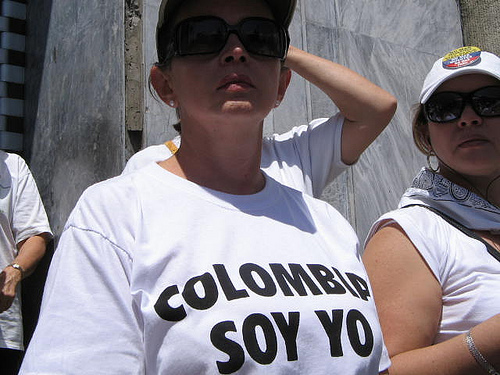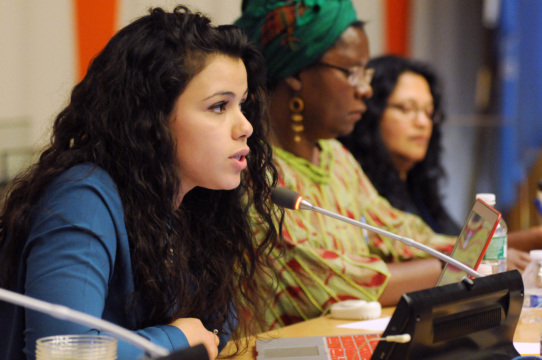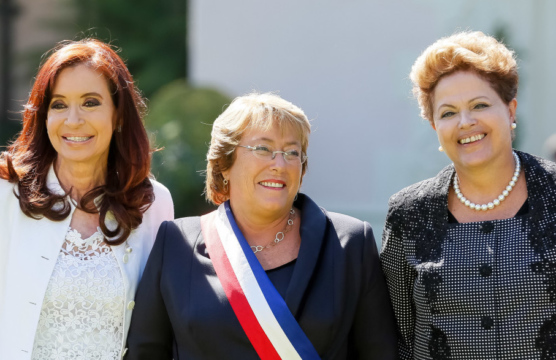What Roles are Women Playing in Mexico’s Drug War?
What roles are women playing in Mexico’s brutal drug trafficking war?
Women are integral to the process of post-conflict reconstruction in Latin America.
On Friday, January 23, 2009, a panel of four women leaders from Bolivia and Colombia discussed the role of women in promoting a culture of non-violence and peace-building in the region.
Jointly hosted by the Inter-American Dialogue and the Institute for Inclusive Security, the meeting followed the tenth annual Colloquium and Policy Forum which took place in Washington over the preceding week. Hosted by the Institute for Inclusive Security, the policy forum convened regional delegations of women from 13 different conflict areas. The four panelists were among this group of accomplished women leaders.
In Bolivia, regional and ethnic tensions underlie many of the difficulties facing women. From clashing indigenous groups to the schism between Sucre and La Paz, conflict in Bolivia is multi-layered. Panelist Juanita Roca, a researcher from the UNIR Bolivia Foundation and specialist on indigenous methods of conflict resolution, spoke of the need to establish an open dialogue that fosters exchange between conflicting groups before women can emerge in positions of power.
Maria Eugenia Rojas, executive director of The Women’s Councilors’ Association in Bolivia, approached the issue from a different angle. Rojas works strategically with the government and other national institutions to bring women to the forefront of the political process, all the while fighting to empower women in rural areas—especially victims of political violence. Among other tactics, her organization pursues legal strategies. For example, Rojas is urging the approval of a law that targets political violence against women, and hopes to change minimum participation levels in quota laws from 30 to 50 percent.
In Colombia, civil conflict is fueled by drug trafficking, guerrilla warfare and rural poverty, and while the emergence of women leaders has been stymied by these challenges, there have been some advances in laws that promote peace and justice.
Panelist Evelyn Garrido Rodriguez, a political scientist in the field of post-conflict resolution in Colombia, stated that women are the linchpin of post-conflict reconstruction. Still, women need to be made aware of their rights and receive capacity-building training. For example, Garrido recommended that initiatives such as the Disarmament, Demobilization and Reintegration (DDR) process, should be gender sensitive and address the specific challenges facing women.
Emiliana Bernard, journalist and long-time Afro-Colombian activist, stated that overall, women have greatly increased their participation in the Colombian democratic process. Part of this, admitted Bernard, has to do with the 1991 Constitution that devotes a handful of articles to advancing women’s visibility in government.
But Bernard sounded the alarm on the Afro-Colombian community of the Pacific coast, noting that it is largely excluded from participation in civil society, a situation that is particularly true of the women in this demographic. She saw the need for an alliance of women’s organizations and increased participation from the newly formed Colombian women’s congressional caucus to combat the exclusion of Afro-Colombian women in the political process. Said Bernard, “we need to continue the struggle and we need more participation of minority women.”
There was a consensus among the speakers that a fundamental component of empowerment involves implementing—and augmenting— pre-existing legislation such as domestic violence and quota laws. Said one panelist, “we have to fill the gap to make political realties, local realities.” Panelists also agreed on the need for a cohesive multi-lateral alliance, connected across all sectors of society. After all, Bernard said, “Change cannot arrive alone… you have to work together to give the people the opportunity to do something.”
What roles are women playing in Mexico’s brutal drug trafficking war?
How are women faring in Latin America? Where has progress been made and how has that been achieved?
Would this be a more compassionate, more peaceful planet if more of it were ruled by women?
 FOR-USA Fellowship of Reconciliation
FOR-USA Fellowship of Reconciliation

